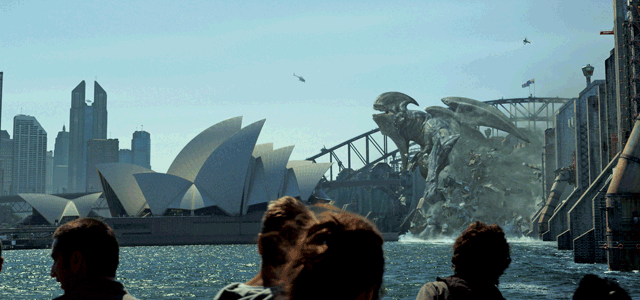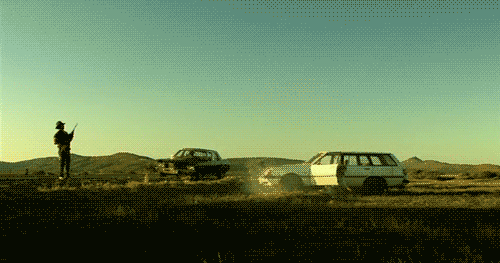Is ‘Wolf Creek 2’ The Most Vital Australian Political Film Of The Year?
Greg McLean's sequel uses brutal satire to skewer Abbott's statement on the responsibility of publicly-funded bodies.

“A lot of people feel at the moment that the ABC instinctively takes everyone’s side but Australia’s… I think it dismays Australians when the national broadcaster appears to take everyone’s side but it’s own and I think it is a problem.”
So said Prime Minister Tony Abbott in his infamous conversation with 2GB’s Ray Hadley last month. For all the sudden spotlights that have been shone on the Australian Broadcasting Corporation about what they should or shouldn’t report on, allegations that a government-funded body shouldn’t leap to be critical of their own country isn’t exactly new for the predominantly taxpayer-funded local film industry.
–
What Have You Done For Me Lately?
For as long as I can remember — which, since I was born in 1985, is admittedly only about half of the Aussie film industry’s post-‘70s renaissance period — local films have had a curious gauge attached to them in how they can or can’t affect tourism. For instance, films like Baz Luhrmann’s Australia (2009) are given central focus in international tourism campaigns while Wolf Creek (2005) was suggested to be responsible for a downturn in British tourists. Joe Hockey, then Federal Minister for Tourism, even labeled Sydney “complacent“ in failing to adequately capitalise on the success of Pixar’s Finding Nemo (2003).
Meanwhile, a recent press release by Queensland Arts Minister Ian Walker announcing local filming of US sitcom Modern Family in the Whitsundays concentrated more heavily on how “it’s very exciting for our tourism industry to know that places like the Great Barrier Reef and Hayman Islands will be seen by millions of people right round the world,” rather than the art itself.
–
Keep Your Hands Off My Industry
For all the slings and arrows that have been thrown at the local film industry — and there have been many, like this hilariously hyperbolic, factually incorrect, and poorly-researched piece from 2006 by former Fairfax writer Miranda Devine — it’s a genuine miracle that filmmakers have more or less been allowed to do what they please with their funding. While Tony Abbott hasn’t gotten his hands on it yet (nor am I aware of any direct plans to attack it like a kaiju in Pacific Rim, but you can never can tell), there’s a general belief that — like a news organisation — the film industry shouldn’t merely be a puppet for its benefactors’ whims.
Audiences may crave more audience-friendly uses of their taxes like Red Dog (2011) and The Sapphires (2012), or bigger budget international co-productions like Happy Feet (2006) and The Great Gatsby (2013), but even when sexually provocative titles like Sleeping Beauty (2012) or The Book Of Revelation (2006) stir questions about Screen Australia and other funding bodies’ standards, they’re almost always swept under the rug pretty quickly until the next director chooses to make something as confronting.
–
The Return Of “Head On A Stick”
Now that the long-awaited Wolf Creek 2 opened across screens this weekend, we may just start hearing the rumblings again. And yet with this nine-years-later sequel to his original horror shocker, writer/director Greg McLean — who’s spent his downtime producing other Australian directors’ works like Red Hill (2010) and Crawlspace (2012) — may in fact be a more vital piece of filmmaking than its blood-thirsty slasher pedigree suggests. It could be a more important film for our times than even McLean could have expected.
Hailed by The Hollywood Reporter as “a gift to gore and splatter fans”, and “grotesquely funny” by industry bible Variety, Wolf Creek 2 is very much in the same wheelhouse as horror films of the past that took the culture wars of the day and presented them in increasingly brutal ways. Much like how Wes Craven’s infamous The Last House On The Left (1972) took the horrors of the Vietnam War and twisted them into a horrific home soil commentary, Wolf Creek 2 takes the “boat people” debate and, according to Quickflix, makes “a damning satire of Australian values, particularly as we enter a renewed age of ‘other’-fearing”, before claiming that “only someone as passionate about our nation, and so angry about its current direction, could make something so potent.”
–
The Right Side Of History
Will Prime Minister Abbott and his parliamentary/media cronies come for McLean, Mick Taylor (played again by John Jarratt), and the Australian film-funding bodies that paid for their outback depravities? If they do, they’ll look mighty silly, just as they always do when threatening artistic integrity and censorship.
Like every country that has a government-funded film industry, everyone has an opinion on what they should or should not be making, and it’s based almost always on things like box office. Ivan Sen’s excellent Mystery Road (2013), for instance, typically did not do well with ticket-buyers, despite being very good. It’s screening on ABC in January, however, was watched by over half-a-million people. Given that film’s unapologetic view of a racist Australia, I’m sure many think the ABC is where it belongs.
If Wolf Creek 2 is the first in a new wave of high-profile politically-charged films, then we should be all for it. What use is having a film industry that’s not beholden to Hollywood-style studio dictatorship if not to challenge, anger and provoke discussion?
–
Glenn Dunks is a freelance writer and film critic from Melbourne, and currently based in New York City. His work has been seen online (Onya Magazine, Quickflix), in print (The Big Issue, Metro Magazine, Intellect Books Ltd’s World Film Locations: Melbourne), as well as heard on Joy 94.9.



